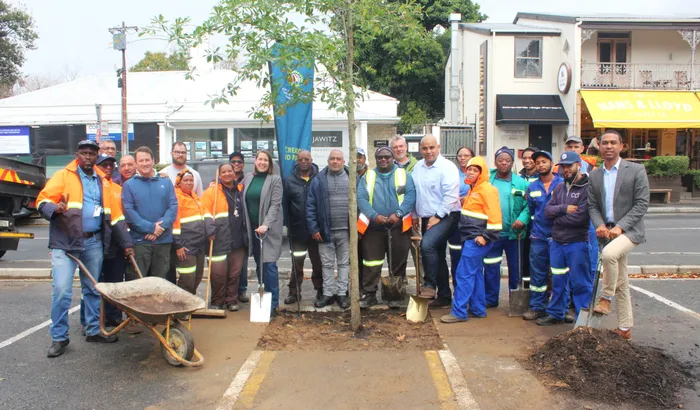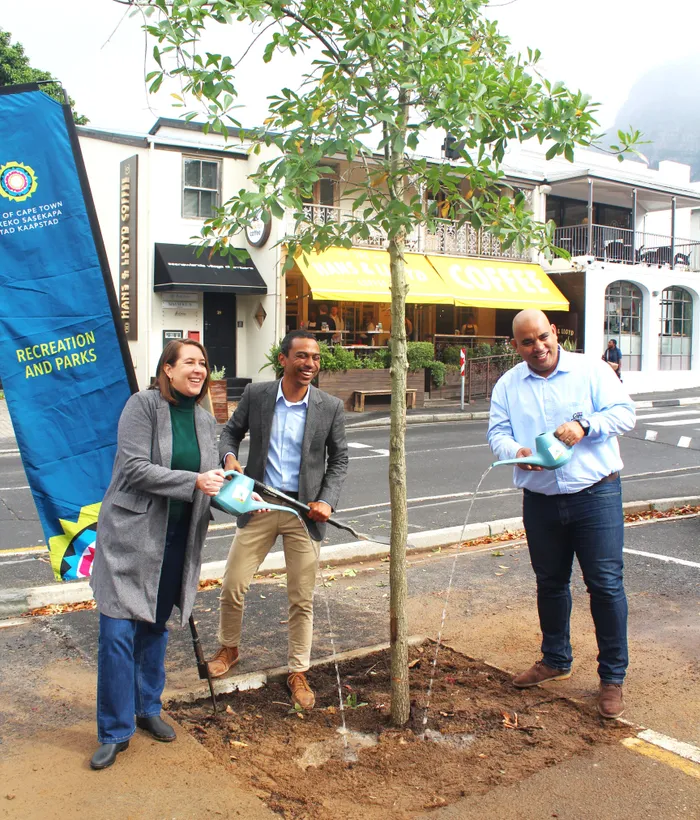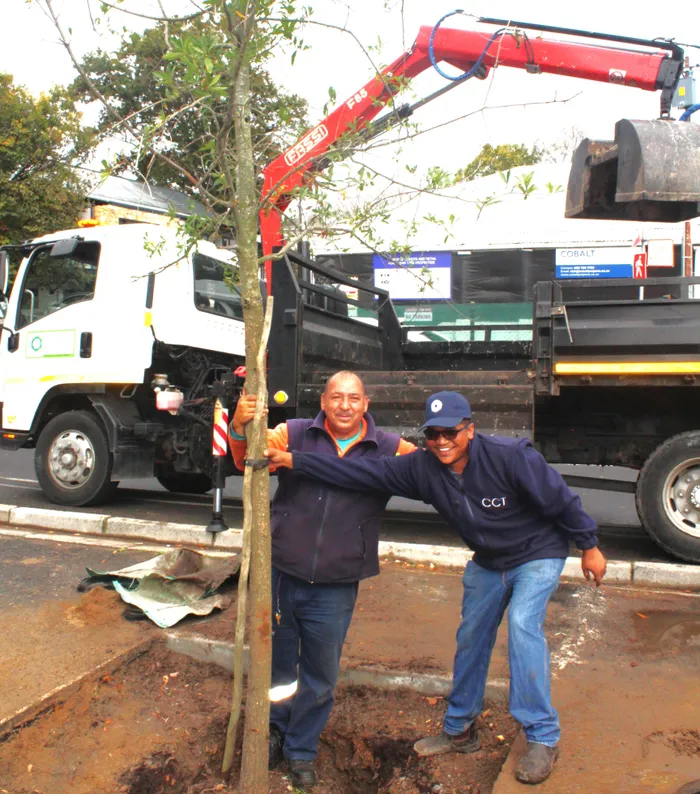Newlands landscape revitalised amid invasive beetle threat

Deputy mayor Eddie Andrews, pictured in the middle with the golden spade, along with City officials and staff from the Recreation and Parks department at the tree-planting ceremony in Newlands.
Image: Wesley Ford
The City planted four Water Oak trees in a Newlands parking lot on Monday, May 26, to replace the trees that were infected by an invasive tree-killing beetle last year.
The Polyphagous Shot Hole Borer (PSHB) beetle, which was first spotted in Somerset West in 2019, spread to the southern suburbs in January 2023, with the first sighting in a Boxelder at a private residence in Newlands (“Invasive, tree-killing beetle hits southern suburbs”, Thursday February 2, 2023). A week later it spread to Rondebosch, Mowbray and Claremont.
The beetle is the size of a sesame seed, approximately 2mm in length, and poses a threat to exotic and indigenous trees across the country. The beetle’s most likely pathway or vector is through the movement of infested wood, originating from dead or dying PSHB-infested trees, including wood intended to be used for cooking or heating.
Some of the trees affected in Cape Town include Boxelders, London Planes, English Oaks, Beef Wood, Weeping Willow, Cape Chestnut, Sweet Viburnum, Black Locust, Paperbark, Liquid Amber, Chinese Cottonwood and Maples.
The tree-planting ceremony was attended by deputy mayor Eddie Andrews, Ward 59 councillor Mikhail Manuel, mayoral committee member for community services and health, Francine Higham, TreeKeepers non-profit, Newlands Community Improvement District (CID) and members of the city’s Recreation and Parks department.
In May last year, the City removed six public trees from a Newlands parking lot located on the corner of Kildare Road and Main Street after they fell prey to the PSHB.
At the time, Mr Manuel said they had to remove the trees carefully to avoid any further contamination to other trees (“Newlands trees fall prey to invasive beetle,” Southern Suburbs Tatler, May 16, 2024).
Speaking at the tree-planting ceremony, Mr Andrews says the City is still seeking a sustainable plan, not only to contain but also to mitigate the beetle’s tree infestation.
“It has an economic and agricultural impact and we have engaged with various role players not only in the city, but external experts that can provide our service users with information like the type of equipment or vehicles we must use,” he says.
Mr Andrews says the event on Monday was not only about planting trees. “It is to emphasize our commitment to replacing those trees that have been lost to the beetle’s infestation,” he says.
Ms Higham says it is significant that they are planting trees at the site where trees were removed last year. “The Water Oak trees that are being planted are more resilient against the beetles, they are large trees and have a stronger chance of surviving,” she says.
Ms Higham says collaborative efforts between the City, non-profits and community organisations help improve the urban landscapes.
Chairperson of TreeKeepers non-profit, Clare Burgess says they are happy the trees are being replanted. “It is important to recognise that the invasive beetles are killing off a lot of trees. This new Water Oak tree will stand firm against the beetles and will provide shade during the summers,” she says.
Newlands CID administrator, Tracy Hearne, who was present at the tree-planting ceremony, says they are thrilled that new trees are being planted in the area.
“While it was unfortunate to lose the mature trees, the replanting of resilient trees in their place is a fantastic step forward in restoring the area's natural beauty and ecological balance,” she says.
The City’s Invasive Species Unit will host several community sessions about the PSHB and has called on residents in Claremont and Newlands to attend.
The first community session will take place on Tuesday June 3 at Claremont library from 4pm till 6pm, the second and third session will take place at the Alphen Centre on Wednesday June 11 from 10.30am till 1pm and Tuesday June 17 from 2pm till 4pm.
Topics to be discussed include identifying infested trees and what symptoms to look out for; what to do next, what not to do; how to handle infested biomass; how to safely dispose of infested biomass; how to transport green waste; and how to handle equipment and machinery in a manner that will not spread the pest to other areas.
The City has listed precautions the public can take to prevent the spread of the beetle:
- Chip the tree, or if this is not possible, cut the wood into smaller pieces that can be placed in refuse bags. Seal all infested material in refuse bags and put these in direct sunlight for at least six weeks in summer and up to six months in winter.
- Dump the chips in your compost heap as the heat build-up will kill the beetle.
- Burn infected wood chips at appropriate incineration facilities.
- Seek assistance from trained and equipped service providers with sound knowledge of the beetle.
- Do not move plant/tree material/firewood outside of areas where the beetle has been confirmed to be present.
- Do not transport any form of green waste in open vehicles; cover it with sail covers.
- Clean tools and equipment used to trim/cut/prune plants.
To date PSHB has been confirmed/observed in over 6 000 trees across the City in the following areas: Somerset West, Strand, Penhill, Newlands, Constantia, Rondebosch, Observatory, Mowbray, Rosebank, Claremont, Kenilworth, Wynberg, Diep River, Pinelands, Durbanville, Brackenfell, Kraaifontein, Bellville and Parow North. Since 2019, PSHB presence and symptoms have been observed on 116 tree species in Cape Town, 34 of which are indigenous and 82 alien.
Report beetle sightings online at www.capetown.gov.za/ invasivespecies, by calling 021 4444 2357 or sending an email to invasive.species@captown.gov.za

From left are Mayoral committee member for community services and health, Francine Higham, Ward 59 councillor Mikhail Manuel and deputy mayor Eddie Andrews tending to the new Water Oak tree.
Image: Wesley Ford

Planting the Water Oak tree are Igshaan Boltman, left, and Gerswin Oerson from the City's Recreation and Parks department Newlands Depot.
Image: Wesley Ford